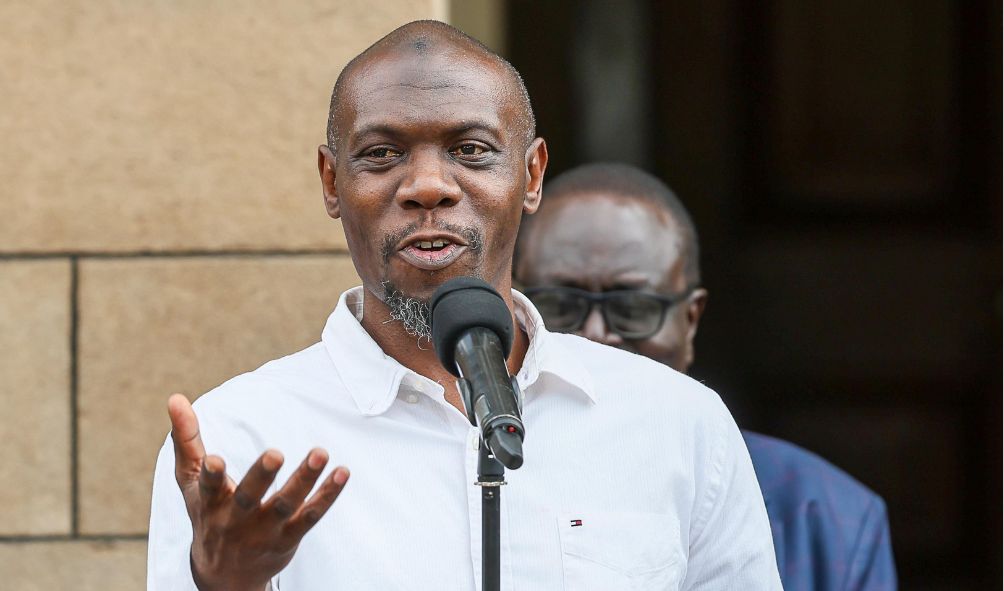
STEPHEN MUNYAKHO: How Victim’s Children Delayed His Scheduled Execution
Stephen “Stevo” Munyakho, who spent more than a decade facing execution in Saudi Arabia, has spoken out about the circumstances that delayed his sentence and the lengthy journey to freedom.
In an interview with Citizen TV on Wednesday night, Stevo described how a legal provision under Sharia law postponed his execution after he was convicted of killing a Yemeni colleague, Abdul Halim Mujahid Makrad Saleh, after a fight in April 2011.
Stevo was injured during the altercation and had to be rushed to the hospital.
He claimed they were friends with Saleh, but a salary conflict resulted in the unintentional killing, which he still regrets.
Although he had lived in Saudi Arabia since 1996, his life changed dramatically after the unfortunate occurrence.
Stephen Munyakho: The death sentence was given in 2016 but with a condition that it would not be carried out until the deceased children became of age. In prison we had many other people who were on death row like me; some drug related, others man slaughter #JKLive pic.twitter.com/w4SQch4NSS
— Citizen TV Kenya (@citizentvkenya) July 30, 2025
Stevo stated that he was sentenced to death in 2016, five years after the incident occurred.
However, a special legal need halted the proceedings. Under Islamic law, if the victim’s children are still minors, an execution cannot take place until they reach legal age.
This gives the family the option of demanding capital punishment, accepting compensation (diyya), or issuing forgiveness.
“The sitting of 2016, that was the first time they said you’re being sentenced to death but there was a condition on it,” he said.
“They could not carry it out because the deceased had young children and they had to come of age. So that bought us time for negotiations.”
He also discussed how the Saudi court system distinguishes between public and private rights, which influenced the evolution of his case.
Initially, he received a five-year prison sentence.
However, when the victim’s family refused compensation and advocated for execution, private rights gained precedence.
“Under Sharia law, we have private and public rights. Towards the end of five years, I was summoned to court and the widow came, accompanied by the brother,” he said.
“At that time, they had given 120,000 riyal for accidental killing. They said they didn’t want it; they wanted execution. Private rights override public rights.”
Stephen Munyakho: We had a misunderstanding, which ended up in a fight, and it escalated until there were some stabbings, which were not intentional. The main cause of his death was not from the stabbing from the wound; the doctor’s report said that he delayed going to the… pic.twitter.com/tHrmDjxSsn
— Citizen TV Kenya (@citizentvkenya) July 30, 2025
Stephen Munyakho: Despite the fact that I am happy to be back home, I deeply regret whatever happened. It’s a phase that I’d gradually have to get out of as time goes by. Whatever happened, I am deeply sorry about it #JKLive pic.twitter.com/HpnGlVKUXh
— Citizen TV Kenya (@citizentvkenya) July 30, 2025
Efforts to save Stevo’s life gained traction once the Kenyan government intervened, launching negotiations with the deceased’s relatives.
The family eventually agreed to consider compensation, but only for 10 million Saudi riyals, which was roughly equivalent to Sh400 million at the time.
“The initial figure was 10 million riyal. They wanted it out of court; that’s when the Saudi government intervened and said it must be stated in court. That’s when the negotiations began,” he said.
His execution was postponed several times as diplomatic and religious efforts grew stronger to rescue his life.
ALSO READ:
- DCP’s Malala Explains Why United Opposition Chiefs Snubbed Gachagua’s Return
- UK To Pay A Measly Ksh22K To BATUK’s Fire Victims In Laikipia
- Wetangula, CJ Koome Exchange Words Over Courts-Parliament Relationship
- VIHIGA: COP Shoots Dead A Colleague Before Disappearing
- CHAN PRIZE MONEY: Breakdown Of All Participants As Kenya Bags Ksh58 Million
In March 2025, a watershed moment occurred when the deceased’s relatives accepted diya, or blood money, in the sum of $1 million (about Sh129 million).
The funds were mobilised through the intervention of Kenya’s Muslim community, the government and the Muslim World League.
He was officially released on July 22, 2025, and performed Umrah before flying home.
He arrived in Nairobi in the early morning hours of July 29, to an emotional welcome by his family, supporters and government officials.
STEPHEN MUNYAKHO: How Victim’s Children Delayed His Scheduled Execution






